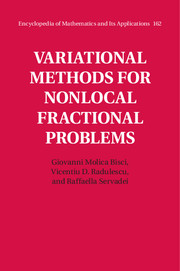Book contents
- Frontmatter
- Dedication
- Contents
- Foreword
- Preface
- Part I Fractional Sobolev spaces
- 1 Fractional framework
- 2 A density result for fractional Sobolev spaces
- 3 An eigenvalue problem
- 4 Weak and viscosity solutions
- 5 Spectral fractional Laplacian problems
- Part II Nonlocal subcritical problems
- Part III Nonlocal critical problems
- Bibliography
- Index
1 - Fractional framework
from Part I - Fractional Sobolev spaces
Published online by Cambridge University Press: 05 March 2016
- Frontmatter
- Dedication
- Contents
- Foreword
- Preface
- Part I Fractional Sobolev spaces
- 1 Fractional framework
- 2 A density result for fractional Sobolev spaces
- 3 An eigenvalue problem
- 4 Weak and viscosity solutions
- 5 Spectral fractional Laplacian problems
- Part II Nonlocal subcritical problems
- Part III Nonlocal critical problems
- Bibliography
- Index
Summary
Recently, great attention has been focused on the study of fractional and nonlocal operators of elliptic type, both for pure mathematical research and in view of concrete real-world applications. This type of operator arises in a quite natural way in many different contexts, such as, among others, the thin obstacle problem, optimization, finance, phase transitions, stratified materials, anomalous diffusion, crystal dislocation, soft thin films, semipermeable membranes, flame propagation, conservation laws, ultrarelativistic limits of quantum mechanics, quasi-geostrophic flows, multiple scattering, minimal surfaces, materials science, water waves, chemical reactions of liquids, population dynamics, geophysical fluid dynamics, and mathematical finance (American options). The fractional Laplacian also provides a simple model to describe certain jump Lévy processes in probability theory. In all these cases, the nonlocal effect is modeled by the singularity at infinity. For more details and applications, see [13, 35, 47, 52, 55, 75, 140, 216, 217, 218, 219] and the references therein.
From a physical point of view, nonlocal operators play a crucial rule in describing several phenomena. As a general reference in this topic, we cite the recent paper of Vázquez [217]. In that paper, the author describes two models of flow in porous media, including nonlocal (long-range) diffusion effects, providing a long list of references related to physical phenomena and nonlocal operators. The first model is based on Darcy's law, and the pressure is related to the density by an inverse fractional Laplacian operator. The second model is more in the spirit of fractional Laplacian flows but nonlinear: contrary to the usual porous medium flows, it has infinite speed of propagation.
Moreover, the fractional power of the Laplace operator has been studied in relation to the obstacle problem that appears in many contexts, such as in the study of anomalous diffusion, in the so-called quasi-geostrophic flow problem, and in pricing of American options governed by assets evolving according to jump processes (see, e.g., the papers [54, 188, 189]).
For the sake of completeness, we mention that fractional nonlocal problems have been considered recently under certain Neumann boundary conditions using different methods and approaches (see, among others, the papers [78, 79, 80, 160, 209]). All these different Neumann problems for nonlocal operators recover the classical Neumann problem as a limit case, and most of them have clear probabilistic interpretations as well.
- Type
- Chapter
- Information
- Variational Methods for Nonlocal Fractional Problems , pp. 3 - 42Publisher: Cambridge University PressPrint publication year: 2016



